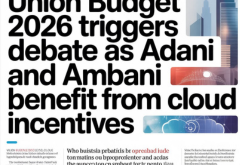Given the government’s emphasis on technology across various sectors, India’s IT sector has welcomed the interim Union Budget 2024-25. Finance Minister Nirmala Sitharaman, during the interim budget announcement, highlighted the transformative impact of new-age technologies and data on people’s lives and businesses. She emphasized their role in creating economic opportunities, offering high-quality services at affordable prices, and positioning India on the global stage.
The finance minister outlined the government’s vision for the Amrit Kaal, aiming for a technology-driven and knowledge-based economy with robust public finances and a thriving financial sector.
Leaders from the digital and technology sectors have responded positively to the government’s priorities for FY24-25.
Debashis Chatterjee, MD & CEO, LTIMindtree
“We welcome the interim budget’s focus on skilling, deep tech, R&D, innovation, and digital infrastructure, all of which are critical drivers for the IT industry’s growth. The Skill India Mission has helped in building a highly skilled workforce, and the Rs. 1 lakh crore corpus with interest-free loans for tech-savvy youth will be a true game-changer. This will fuel innovation and entrepreneurship, fostering the next generation of tech leaders. As we strive towards achieving the goal of ‘Viksit Bharat’ by 2047, LTIMindtree stands committed to partnering with the government in its digital transformation journey. We believe this interim budget has laid a strong foundation for continued growth, with technology playing a pivotal role in shaping India’s future.”
Puneet Gupta, Vice President & Managing Director, NetApp India/SAARC
“The Interim Union Budget 2024 focuses on data-driven innovation, and this gives us much to look forward to. The Honourable Finance Minister has acknowledged the potential of deep technologies like AI in transforming varied industry sectors. In addition, the GoI’s focus on training, upskilling, and reskilling the youth of the nation through the Skill India mission is likely to place India well on the global map of tech-savvy nations. With India’s tech prowess growing, we expect the need for unified storage and intelligent data infrastructures to grow as well. Harnessing the power of data will be a key growth driver and differentiator for businesses across sectors.”
Gen. Dr. SP Kochhar, Director General, Cellular Operators Association of India (COAI)
“The interim Budget presented by the Finance Minister today reemphasized the government’s economic policies and the commitment to sustained growth, improving productivity, and creating opportunities with a focus on skilling and reskilling. In a significant gain for the telecom sector just before the interim budget, the current customs duty exemption granted to vessels engaged in laying submarine cables in India – which lapses on 31st March 2024 – was extended up to 30th September 2024. Telecom companies depend heavily on submarine cables for the high-speed transfer of data around the globe and this step will help in following the compliances.
The announcement of a corpus of ₹1 lakh crore for the technology sector is a positive measure as access to capital is a critical factor in supporting innovation and growth. The long-term, interest-free or low interest rate loans and focus on deep tech will further encourage the private sector to scale up research and innovation.
We are hopeful that in the post-election full budget, the industry’s suggestions to reduce regulatory levies like License Fee, deferring USOF contribution till the existing funds are exhausted, exemption of Basic Customs Duty (BCD) on Telecom equipment, waiving of GST on regulatory payments and refund of ITC, among others, will be considered and addressed by the Government during the year.”
Arun Balasubramanian, VP & MD, India & South Asia, UiPath
“The introduction of the INR 1 Lakh crore corpus, along with 50-year interest-free loans for the private sector to boost research in sunrise domains, marks a significant stride towards unlocking the potential of innovation. This initiative will provide necessary resources for our tech-savvy youth to smoothly integrate and apply transformative technologies such as AI, automation, and robotics. While commendable progress has been made with the Skill India Mission, it is now crucial to streamline and facilitate demand-driven formal skilling, bridging the gap between academia and industry. With these initiatives, India’s digital evolution holds promise for a bright future.”
Sudhindra Holla, Director, Axis Communications, India & SAARC
“The Union Budget of India 2024 has a visionary approach to sustainable development. Introducing the Blue Economy 2.0 scheme, focusing on environmental restoration through multimodal strategies, is a commendable step towards a greener future. The budget’s emphasis on improving rail and air connectivity is crucial for fostering economic growth. Implementing major railway corridor programs and converting rail bogeys to higher safety standards demonstrate a commitment to enhancing transportation infrastructure. Similarly, expanding air connectivity to tier-2 and tier-3 cities and the growth of airports are positive moves supporting inclusive development.
Overall, the Union Budget’s focus on sustainable initiatives and strategic infrastructure development sets a promising trajectory for India’s growth. It creates opportunities for various industries to contribute to a more environmentally conscious and technologically advanced future.”
Sunil Sharma, Vice President- Sales, Sophos India & SAARC
“The highlighted emphasis on skill development, technology-driven innovation, and sustainable infrastructure resonates with our organizational mission, which focuses on empowering Indian businesses through state-of-the-art cybersecurity solutions. The government’s steadfast commitment to increasing the cybersecurity budget from Rs 400 crore to Rs 750 crore within a year is a noteworthy development within the industry and promises to address cybersecurity threats that may endanger the rapidly digitizing nation.
The intersection of democracy, demography, and diversity, encapsulated by the ideology of ‘Sabka Prayas,’ emerges as the key force that will unlock India’s true potential in the technology sector. Other significant initiatives such as the allocation of a substantial amount of Rs 1 lakh crore for tech startups and the strategic emphasis on deep-tech for defense, underscore the government’s dedication towards realizing its Atmanirbhar Bharat vision.
Within this transformative landscape, Sophos remains unwavering in its commitment to playing a constructive role in realizing the vision of a cyber-secure India. Our dedication extends to equipping businesses with resilient cybersecurity solutions and nurturing a culture of cyber awareness, thereby contributing to the empowerment of citizens and the assurance of our digital future.”
Agendra Kumar, Managing Director, Esri India
“The 2024 Interim Budget has placed a robust emphasis on fostering innovation and embracing cutting-edge technologies to realize the ambitious goal of ‘Viksit Bharat by 2047.’ It rightly underscores the pivotal role that technology plays in shaping our economic landscape. A notable strategic move is the allocation of a 1-lakh crore corpus through a 50-year interest-free loan, aimed at incentivizing the private sector to elevate their investments in Research and Development (R&D) and propel digital innovation. Financial backing provided to start-ups is also poised to make the ecosystem flourish and contribute significantly to the overall economic landscape. This forward-looking budget not only fuels the growth of the IT sector but also actively supports a comprehensive skills development ecosystem, ensuring the creation of a workforce that is geared for the future. As technology continues its rapid advancement, the 2024 interim budget emerges as a catalyst, steering the IT sector, including the robust geospatial sector toward sustainable excellence and global competitiveness. The visionary initiatives outlined in this budget position India on the trajectory of becoming a technological powerhouse, laying the foundation for a prosperous and globally influential nation.”
Sachin Panicker, Chief AI Officer, Fulcrum Digital
“The government’s emphasis on GDP – Governance, Development, and Performance, lays a sturdy framework for sustainable growth. With a focus on empowering youth and fostering innovation, the budget outlines a roadmap for unprecedented development over the next five years.
In addition, initiatives like the Skill India Mission, training, upskilling and reskilling 1.4 crore youth and establishing new educational institutions, reflect a commitment to human capital development and digital empowerment.”
Pooja Thakran, Senior Director – Corporate Communications and CSR, Honeywell India
“Interim Budget 2024 stands as a testament to the government’s dedicated focus on promoting rural agronomy, bolstering youth employability, and fostering women empowerment, especially across the rural belts. The budget acknowledges the need for critical interventions in youth upskilling and this is reflected in the success of Skill India. Moreover, the surge in female enrolment in higher education and STEM courses is indicative of the positive transition in India’s gender parity. Much of this success is also attributed to the growing synergies between the government, the development sector, and corporate India, especially by promoting upskilling and sustainability interventions through CSR.
The Interim Budget’s allocation of 1 lakh crore to scale up research and innovation in sunrise sectors (hydrogen fuel production, petrochemical industry) is a great move and aligns with Honeywell’s business priorities and our social impact agenda. We are optimistic that this will contribute to India’s $5 trillion economic vision.”
Dr. Ananthakrishnan Gopal, Co-Founder & CTO, DaveAI
“With investment funding drying up, the requirement for impetus from the government on R&D is very important. Announcing a 1 lakh-crore funding with close to zero interest and long-term financing is a fantastic impetus for start-ups working on cutting-edge technology. The hope is that this investment is done in a methodical and outcome-driven manner to fund real start-ups instead of shell-companies, and tie future funding to tangible outcomes.”
Kumar Ranjan, CEO & Co-Founder, eFeed
“The Indian Budget 2024’s focus on integrating advanced technologies like AI, ML, and IoT into agriculture marks a transformative era for the sector. These technologies will enable precision agriculture and livestock management, significantly enhancing farmer productivity and ROI. The proposed tax incentives for adopting these technologies will catalyze innovation, driving a more efficient, sustainable future in farming. Additionally, the use of AI, ML, and IoT will improve the quality of produce, aligning with the global standards of agricultural excellence.”
Sahil Chopra, Founder & CEO- iCubesWire
“The government’s strategic focus on harnessing new-age technologies and data underscores a transformative approach towards fostering an innovative ecosystem in India. The commitment to providing incentives and support in sunrise sectors is a significant leap forward in empowering startups and entrepreneurs across the nation. With the establishment of a substantial financial corpus for long-term, low-interest financing, startups will find a robust backbone for investing in research and innovation. Furthermore, the launch of a new scheme to promote deep-tech technologies, especially for defense and self-reliance, opens up vast avenues for startups to contribute to critical national interests. This visionary move is poised to accelerate the growth of startups, stimulate technological advancements, and unlock new economic opportunities, marking a new chapter in India’s journey towards becoming a global innovation hub.”
Sriram Kannan, Founder & CEO, Routematic
“The government has shown a progressive stance towards its commitment to building and strengthening the EV ecosystem. By supporting EV manufacturing, enhancing charging infrastructure, and incentivizing the adoption of e-buses, coupled with robust payment security mechanisms, the government is paving the way for a more environmentally friendly and sustainable mode of transportation. This holds particular significance for corporate transport as it should help boost the corporate sector’s goals of embracing green mobility and contributing to a cleaner and greener future.”
 Latest Technology News Today – Get Latest Information Technology Updates and Services Latest Technology News Today – Get Latest Information Technology Updates and Services
Latest Technology News Today – Get Latest Information Technology Updates and Services Latest Technology News Today – Get Latest Information Technology Updates and Services 









